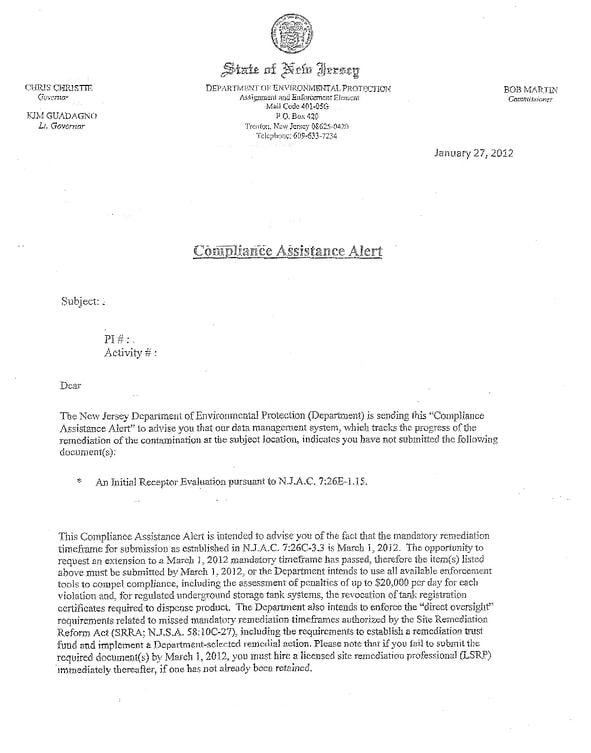New Jersey Compliance Assistance Alert
The NJDEP LSRP Deadline is approaching and the NJDEP is sending commercial property owners with a Compliance Assistance Alert letter. The letter informs commercial property owners who have unresolved NJDEP case numbers of what aspect of New Jersey code N.J.A.C 7:26C-3.3 they have not yet complied with. The New Jersey LSRP program is major shift in how owners of commercial contaminated properties in New Jersey must take a proactive stance in complying with unresolved environmental issues. THe NJDEP regulations set mandatory time frames to follow and the Compliance Assistance Alert is detailing what aspects of the regulations are not completed.
The NJDEP is no longer allowing contaminated commercial property owners to do nothing which has been the regulatory environment in New Jersey for many years. Now with the Site remediation Reform Act the NJDEP is requiring owners to hire a Licensed Site Remediation Professional to help them comply with New Jersey's Technical Requirements for Site Remediation.
New Jersey's LSRP program is meant to bring together property owner's with experienced and NJDEP licensed environmnetal professionals who can help navigate New Jersey's environmental regulations.
The Compliance Assistance Alert letter as well as other letters that the NJDEP has been sending to owners of properties that are listed on the New Jersey Contaminated Site List is to inform them of their obligation to comply with New Jersey's environmental code. Non compliance will ultimately result in fines.
If you have received the following letter from the NJDEP informing you of the LSRP program and giving you the option to enter the program, now may be your window of opportunity to close your case number. Curren offers a free one hour consultation of your case, call 888-301-1050 to speak to one of our environmental professionals.

NJDEP Compliance Assistance Alert Letter

The New Jersey Site Remediation Reform Act (“SRRA”), approved in May 2009, set in place the requirements for environmental professional licensing as Licensed Site Remediation Professional (“LSRPs”). The program has been modeled after a similar program in Massachusetts initiated in 1993. It is reported that the NJDEP currently has over 15,000 cases awaiting remedial activity. The implementation of the LSRP Program would result in a significant increase in the amount of sites restored in a timely manner.

